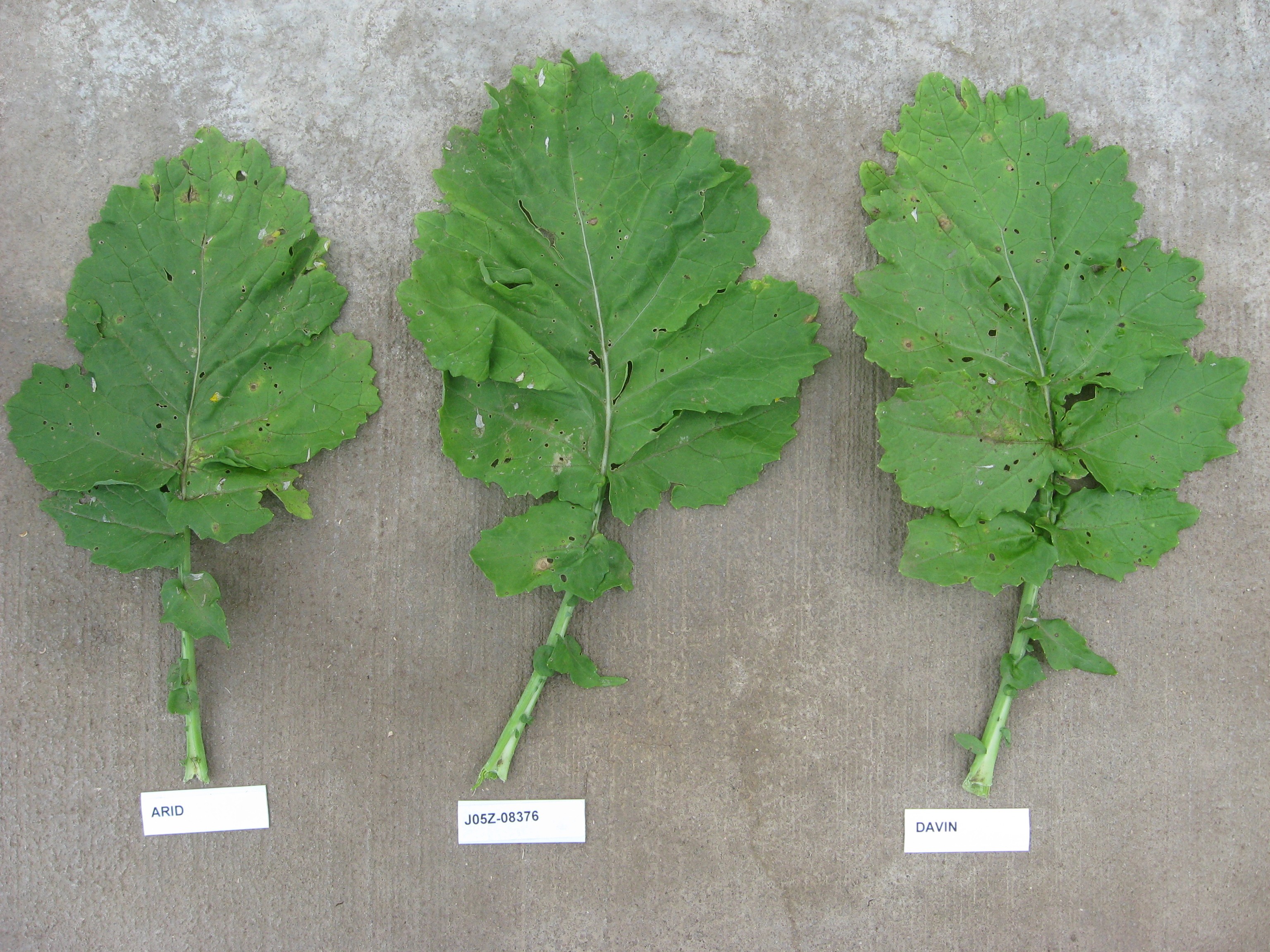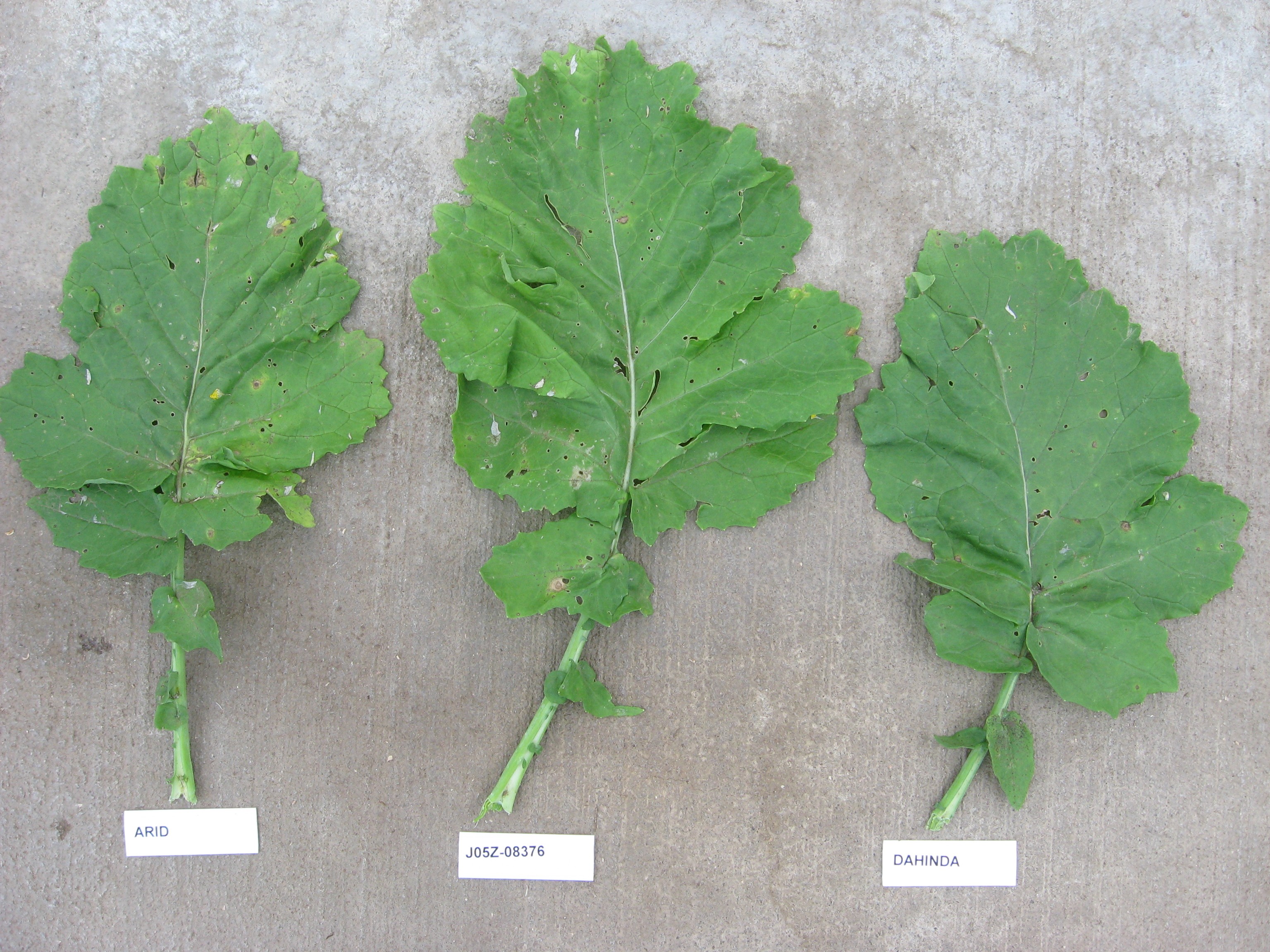8571
Canola Quality Oriental Mustard
| Denomination: | '8571' |
|---|---|
| Botanical Name: | Brassica juncea |
| Applicant/Holder: |
Viterra Inc. 201- 407 Downey Road Saskatoon, Saskatchewan S7N 4L8 Canada |
| Breeder: |
Derek Potts, Viterra Inc., Saskatoon, Saskatchewan |
| Agent in Canada: |
Viterra Inc. 2625 Victoria Avenue Regina, Saskatchewan S4T 7T9 Canada |
| Application Date: | 2008-04-21 |
| Application Number: | 08-6300 |
| Grant of Rights Date: | 2010-08-30 |
| Certificate Number: | 3938 |
| Exemption from compulsory licensing: | Yes |
| Expiry date for exemption from compulsory licensing: | 2012-08-30 |
| Date rights revoked: | 2012-01-16 |
Variety Description
Varieties used for comparison: 'Arid', 'Dahinda' and 'Davin'
Summary: '8571' is resistant to imidazolinone herbicides whereas the reference varieties are not. The leaves of '8571' have medium to strong rugosity whereas the leaves of 'Arid' have weak to medium rugosity. The leaves of '8571' are longer than those of 'Arid' and 'Dahinda'. '8571' flowers earlier than 'Davin' and later than 'Arid' and 'Dahinda'. '8571' matures later than 'Dahinda' and earlier than 'Davin'. Plant height at maturity of '8571' is taller than that of 'Arid'.
Description:
PLANT: open pollinated, spring seasonal type, tall at maturity
LEAF: medium green, medium number of lobes, sharp margin, medium depth dentations, medium to strong rugosity
FLOWERS: yellow, all anthers shedding
SILIQUE: semi-erect attitude, medium length, medium length beak, medium length pedicel
SEED: yellow
AGRONOMIC CHARACTERISTICS: good resistance to lodging
QUALITY CHARACTERISTICS: erucic acid 0.2% of total fatty acids, oil content 43.3% of whole dried seed, protein 48.5% of dried oil free meal, low glucosinolates 13.2 µmol/g of whole seed, allyl 0.4 µmol/g of whole seed
REACTION TO CHEMICALS: resistant to imidazolinone
DISEASE RESISTANCE: resistant to moderately resistant to Blackleg (Leptosphaeria maculans asexual stage: Phoma lingam), moderately resistant to moderately susceptible to White Rust (Albugo candida, race 2A) and moderately susceptible to susceptible to White Rust (Albugo candida, race 2V)
Origin & Breeding History: '8571' is a microspore derived doubled haploid line produced from the cross 'Davin'//J04E-0044/J03Z-16440, made in 2004 by Viterra Research and Development staff in Saskatoon, Saskatchewan. Following chromosome doubling, the original DH plant was grown in a greenhouse and self-pollinated. The line was selected and designated J05Z-08376. Nursery rows were grown near Temuco, Chile in 2005-2006. Selection was based on agronomic performance, canola-quality traits and resistance to imidazolinone herbicide. '8571' was entered into a first year (private data) Co-op trial in 2006. Based on good agronomic performance and quality characteristics, it was entered a second year of registration trials in 2007.
Tests & Trials: Trials were grown during the summers of 2007 and 2008 in Watrous, Saskatchewan. Plots consisted of 5 rows with a row spacing of 22 centimeters and a row length of 1.3 meters. There were 2 replicates arranged in a RCB design.
Comparison tables for '8571' with reference varieties 'Arid', 'Dahinda' and 'Davin'
Leaf length (cm)
| '8571' | 'Arid' | 'Dahinda' | 'Davin' | |
|---|---|---|---|---|
| mean (LSD=2.2) | 25.8 | 21.5 | 21.8 | 25.9 |
| std. deviation | 3.99 | 3.33 | 3.61 | 2.73 |
Days to flowering (days from planting to when 50% of plants show one or more open flowers)
| '8571' | 'Arid' | 'Dahinda' | 'Davin' | |
|---|---|---|---|---|
| mean | 49.4 | 47.8 | 47.0 | 51.9 |
Maturity (days from planting to maturity)
| '8571' | 'Arid' | 'Dahinda' | 'Davin' | |
|---|---|---|---|---|
| mean | 92.4 | 91.6 | 89.3 | 94.7 |
Plant height at maturity (cm)
| '8571' | 'Arid' | 'Dahinda' | 'Davin' | |
|---|---|---|---|---|
| mean (LSD=13.0) | 130.0 | 113.3 | 119.1 | 130.1 |
| std. deviation | 5.01 | 3.85 | 5.66 | 4.66 |
Click on image for larger view

Canola Quality Oriental Mustard: '8571' (centre) with reference varieties 'Arid' (left) and 'Davin' (right)
Click on image for larger view

Canola Quality Oriental Mustard: '8571' (centre) with reference varieties 'Arid' (left) and 'Dahinda' (right)
- Date modified: